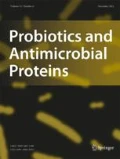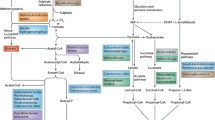Abstract
Several studies have reported that probiotics could modulate host lipid metabolism via altering the intestinal microbiota. Hence, the current study was aimed to assess the efficacy of a mixture of probiotic-contained milk formula (PMF) with three different bacterial strains [Lactobacillus acidophilus (La5), Lactobacillus casei (TMC), Bifidobacterium lactis (Bb12)] on lipid profile and intestinal function in healthy mild hypercholesterolemic volunteers. Totally, 40 healthy mild hypercholesterolemic subjects (180–220 mg/dL) were randomly assigned into two groups as placebo or experimental group. All the subjects were requested to drink either PMF (experimental) or skimmed milk drink formula-placebo (30 g mixed with 200 mL of water) for 10 weeks and continued by 2 weeks of the follow-up period. Supplementation of PMF for 10 weeks significantly improved (p < 0.05) the fecal weight, fecal movement (decreased fecal gastrointestinal passing time) by improving intestinal microbiota (increasing beneficial bacterial species like Lactobacillus, Bifidobacterium spp.), and lag time of low-density lipoprotein (LDL) oxidation. Also, intake of PMF substantially reduced (p < 0.05) the levels of total cholesterol (TC; 8.1%) and low-density lipoprotein cholesterol (LDL-c; 10.4%) and thus showcasing its cardioprotective efficacy. PMF considerably improves gastrointestinal function by modulating fecal movement, intestinal microbiota, and decrease cholesterol and might be helpful in the management of hypercholesterolemia.


Similar content being viewed by others
References
Hajar R (2016) Framingham contribution to cardiovascular disease. Heart Views: J Gulf Heart Assoc 17(2):78–81. https://doi.org/10.4103/1995-705X.185130
Bowry AD, Lewey J, Dugani SB, Choudhry NK et al (2015) The burden of cardiovascular disease in low-and middle-income countries: Epidemiology and management. Can J Cardiol 31(9):1151–1159. https://doi.org/10.1016/j.cjca.2015.06.028
Chiu HF, Huang YC, Lu YY, Han YC, Shen YC, Golovinskaia O, Venkatakrishnan K, Wang CK et al (2017) Regulatory/modulatory effect of prune essence concentrate on intestinal function and blood lipids. Pharm Biol 55(1):974–979. https://doi.org/10.1080/13880209.2017.1285323
Chiu HF, Shen YC, Huang TY, Venkatakrishnan K, Wang CK et al (2016) Cardioprotective efficacy of red wine extract of onion in healthy hypercholesterolemic subjects. Phytother Res 30(3):380–385. https://doi.org/10.1002/ptr.5537
Chiu HF, Chen YJ, Lu YY, Han YC, Shen YC, Venkatakrishnan K, Wang CK et al (2017) Regulatory efficacy of fermented plant extract on the intestinal microflora and lipid profile in mildly hypercholesterolemic individuals. J Food Drug Anal 25(4):819–827. https://doi.org/10.1016/j.jfda.2016.10.008
Lu TM, Chiu HF, Shen YC, Chung CC, Venkatakrishnan K, Wang CK et al (2015) Hypocholesterolemic efficacy of quercetin rich onion juice in healthy mild hypercholesterolemic adults: A pilot study. Plant Foods Human Nutr 70(4):395–400. https://doi.org/10.1007/s11130-015-0507-4
Yoshida N, Yamashita T, Hirata KI et al (2018) Gut microbiome and cardiovascular diseases Dis 6(3):56–65. https://doi.org/10.3390/diseases6030056
Wang K, Yu X, Li Y, Guo Y, Ge L, Pu F, Ma X, Cui W, Marrota F, He F, Li M et al (2019) Bifidobacterium bifidum TMC3115 can characteristically influence glucose and lipid profile and intestinal microbiota in the middle-aged and elderly. Probiotics Antimicrob Proteins 11(4):1182–1194. https://doi.org/10.1007/s12602-018-9441-8
Hill C, Guarner F, Reid G, Gibson GR, Merenstein DJ, Pot B, Morelli L, Canani RB, Flint HJ, Salminen S, Calder PC et al (2014) Expert consensus document: The International Scientific Association for Probiotics and Prebiotics consensus statement on the scope and appropriate use of the term probiotic. Nat Rev Gastroenterol Hepatol 11:506–514
Anandharaj M, Sivasankari B, Parveen Rani R et al (2014) Effects of probiotics, prebiotics, and synbiotics on hypercholesterolemia: A review. Chin J Biol 2014:572754. https://doi.org/10.1155/2014/572754
Lye HS, Kato T, Low WY, Taylor TD, Prakash T, Lew LC, Ohno H, Liong MT et al (2017) Lactobacillus fermentum FTDC 8312 combats hypercholesterolemia via alteration of gut microbiota. J Biotechnol 262:75–83. https://doi.org/10.1016/j.jbiotec.2017.09.007
Wang Y, Ames NP, Tun HM, Tosh SM, Jones PJ, Khafipour E et al (2016) High molecular weight barley β-glucan alters gut microbiota toward reduced cardiovascular disease risk. Front Microbiol 7(129):1–15. https://doi.org/10.3389/fmicb.2016.00129
Irvine SL, Hummelen R, Hekmat S et al (2011) Probiotic yogurt consumption may improve gastrointestinal symptoms, productivity, and nutritional intake of people living with human immunodeficiency virus in Mwanza. Tanzania Nutr Res 31(12):875–881. https://doi.org/10.1016/j.nutres.2011.10.005
Pepoyan A, Balayan M, Manvelyan A, Galstyan L, Pepoyan S, Petrosyan S, Tsaturyan V, Kamiya S, Torok T, Chikindas M et al (2018) Probiotic Lactobacillus acidophilus strain INMIA 9602 Er 317/402 administration reduces the numbers of Candida albicans and abundance of enterobacteria in the gut microbiota of familial Mediterranean fever patients. Front Immunol 9:1–11. https://doi.org/10.3389/fimmu.2018.01426
Shimizu M, Hashiguchi M, Shiga T, Tamura HO, Mochizuki M et al (2015) Meta-analysis: Effects of probiotic supplementation on lipid profiles in normal to mildly hypercholesterolemic individuals. PLoS ONE 10(10):e0139795. https://doi.org/10.1371/journal.pone.0139795
Ishimwe N, Daliri EB, Lee BH, Fang F, Du G et al (2015) The perspective on cholesterol-lowering mechanisms of probiotics. Mol Nutr Food Res 59(1):94–105. https://doi.org/10.1002/mnfr.201400548
Greany KA, Bonorden MJ, Hamilton-Reeves JM, McMullen MH, Wangen KE, Phipps WR, Feirtag J, Thomas W, Kurzer MS et al (2008) Probiotic capsules do not lower plasma lipids in young women and men. Eur J Clin Nutr 62(2):232–237. https://doi.org/10.1038/sj.ejcn.1602719
Lewis SJ, Burmeister S (2005) A double-blind placebo-controlled study of the effects of Lactobacillus acidophilus on plasma lipids. Eur J Clin Nutr 59(6):776–780. https://doi.org/10.1038/sj.ejcn.1602139
Ashraf R, Shah NP (2011) Selective and differential enumerations of Lactobacillus delbrueckii subsp. bulgaricus, Streptococcus thermophilus, Lactobacillus acidophilus, Lactobacillus casei and Bifidobacterium spp. in yoghurt—a review. Int J Food Microbiol 149:194–208. https://doi.org/10.1016/j.ijfoodmicro.2011.07.008
Sadrzadeh-Yeganeh H, Elmadfa I, Djazayery A, Jalali M, Heshmat R, Chamary M et al (2010) The effects of probiotic and conventional yoghurt on lipid profile in women. Br J Nutr 103(12):1778–1783. https://doi.org/10.1017/S0007114509993801
Savard P, Lamarche B, Paradis ME, Thiboutot H, Laurin É, Roy D et al (2011) Impact of Bifidobacterium animalis subsp. lactis BB-12 and, Lactobacillus acidophilus LA-5-containing yoghurt, on fecal bacterial counts of healthy adults. Int J Food Microbiol 149(1):50–57. https://doi.org/10.1016/j.ijfoodmicro.2010.12.026
Eskesen D, Jespersen L, Michelsen B, Whorwell PJ, Müller-Lissner S, Morberg CM et al (2015) Effect of the probiotic strain Bifidobacterium animalis subsp. lactis, BB-12®, on defecation frequency in healthy subjects with low defecation frequency and abdominal discomfort: A randomised, double-blind, placebo-controlled, parallel-group trial. Br J Nutr 114(10):1638–1646. https://doi.org/10.1017/S0007114515003347
Metcalf AM, Phillips SF, Zinsmeister AR, MacCarty RL, Beart RW, Wolff BG et al (1987) Simplified assessment of segmental colonic transit. Gastroenterol 92(1):40–47. https://doi.org/10.1016/0016-5085(87)90837-7
Friedewald WT, Levy RI, Fredrickson DS et al (1972) Estimation of the concentration of low-density lipoprotein cholesterol in plasma, without use of the preparative ultracentrifuge. Clin Chem 18(6):499–502. https://doi.org/10.1093/clinchem/18.6.499
Esterbauer H, Striegl G, Puhl H, Rotheneder M et al (1989) Continuous monitoring of in vitro oxidation of human low-density lipoprotein. Free Rad Res Comm 6(1):67–75. https://doi.org/10.3109/10715768909073429
Samimi M, Dadkhah A, Kashani HH, Tajabadi-Ebrahimi M, Hosseini ES, Asemi Z et al (2019) The effects of synbiotic supplementation on metabolic status in women with polycystic ovary syndrome: A randomized double-blind clinical trial. Probiotics Antimicrob Proteins 11(4):1355–1361. https://doi.org/10.1007/s12602-018-9405-z
Sekirov I, Russell SL, Antunes LC, Finlay BB et al (2010) Gut microbiota in health and disease. Physiol Rev 90(3):859–904. https://doi.org/10.1152/physrev.00045.2009
Kumar M, Nagpal R, Kumar R, Hemalatha R, Verma V, Kumar A, Chakraborty C, Singh B, Marotta F, Jain S, Yadav H et al (2012) Cholesterol-lowering probiotics as potential biotherapeutics for metabolic diseases. Exp Diabetes Res 2012:902917. https://doi.org/10.1155/2012/902917
Fuentes MC, Lajo T, Carrión JM, Cuné J et al (2013) Cholesterol-lowering efficacy of Lactobacillus plantarum CECT 7527, 7528 and 7529 in hypercholesterolaemic adults. Br J Nutr 109(10):1866–1872. https://doi.org/10.1017/S000711451200373X
Kleniewska P, Hoffmann A, Pniewska E, Pawliczak R et al (2016) The influence of probiotic Lactobacillus casei in combination with prebiotic inulin on the antioxidant capacity of human plasma. Oxid Med Cell Longev 2016:1340903. https://doi.org/10.1155/2016/1340903
Acknowledgments
The author would like to thank all the participants involved in this study.
Funding
This trial was funded by Chung Shan Medical University (CSMU4212).
Author information
Authors and Affiliations
Contributions
Hui-Fang Chiu (HFC), Chia-Yuan Fang (CYF), and Chin-Kun Wang (CKW) involved in conceiving and designing this trial. You-Cheng Shen (YCS), Kamesh Venkatakrishnan (KV) helped in statistical analysis. CKW, KV drafted this manuscript. HFC, CYF, YCS aided in subject recruitment and conducted this trial.
Corresponding author
Ethics declarations
Ethics Approval
This trial was approved by Institutional Ethical review Board Panel members of Chung Shan Medical University Hospital, Taiwan (CSMUH: CS08006) under the guidelines put forth by the “Declaration of Helsinki” and Good Clinical Practice.
Conflict of Interest
The authors declare that they have no conflict of interest.
Additional information
Publisher’s Note
Springer Nature remains neutral with regard to jurisdictional claims in published maps and institutional affiliations.
Rights and permissions
About this article
Cite this article
Chiu, HF., Fang, CY., Shen, YC. et al. Efficacy of Probiotic Milk Formula on Blood Lipid and Intestinal Function in Mild Hypercholesterolemic Volunteers: A Placebo-control, Randomized Clinical Trial. Probiotics & Antimicro. Prot. 13, 624–632 (2021). https://doi.org/10.1007/s12602-020-09728-6
Accepted:
Published:
Issue Date:
DOI: https://doi.org/10.1007/s12602-020-09728-6




